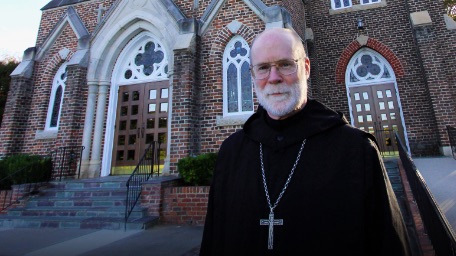
Abbot Placid and recent graduate, Evan Lutz, were quoted in the recent New York Times article, Why Universities Should Be More Like Monasteries. See the excerpt below or click here to read the full article.
No one understands discipline better than the Benedictines, members of the monastic order who follow the rule written by St. Benedict in the sixth century. Undergraduates at Belmont Abbey College outside of Charlotte, N.C., share their quadrangles, sidewalks — even their chess clubs — with Benedictine monks who live in an abbey in the middle of campus. “For the last 1,500 years, Benedictines have had to deal with technology,” Placid Solari, the abbot there, told me. “For us, the question is, how do you use the tool so it supports and enhances your purpose or mission, and you don’t get owned by it.”
Mental distraction was a struggle even for the ancient ascetics who didn’t have Snapchat. When the mind wanders and a monk wants “to bind it fast with the firmest purpose of heart, as if with chains, while we are making the attempt it slips away from the inmost recesses of the heart swifter than a snake,” John Cassian, a fourth-century monk, wrote. Many monasteries don’t totally reject the latest technology, but they are mindful of how they use it. Abbot Placid told me that for novices at his monastery, “part of the formation is discipline to learn how to control technology use.” After this initial time of limited phone and TV “to wean them away from overdependence on technology and its stimulation,” they get more access and mostly make their own choices.
Evan Lutz graduated this May from Belmont Abbey with a major in theology. He stressed the special Catholic context of Belmont’s resident monks; if you experiment with monastic practices without investigating the whole worldview, it can become a shallow kind of mindfulness tourism. The monks at Belmont Abbey do more than model contemplation and focus. Their presence compels even non-Christians on campus to think seriously about vocation and the meaning of life. “Either what the monks are doing is valuable, and based on something true, or it’s completely ridiculous,” Mr. Lutz said. “In both cases, there’s something striking there, and it asks people a question.”

